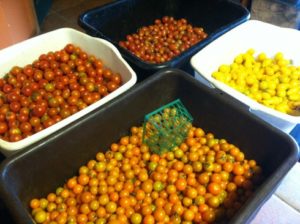What is “healthy” eating anyway?
by Kelsey Miller
Do you eat paleo? Primal? Local? Organic? Gluten-free? Refined sugar-free? Vegetarian? Pescatarian? Vegan? South Beach Diet? Atkins? Hunter-gatherer? Fast food junkie?
 Or are you overwhelmed by what appears to be an ever-evolving set of messages about what is healthy, what our bodies were created to eat, and how to make good food choices? Americans are inundated with messaging that tells us we’re never getting it quite right with food, even as we are sold the “silver bullet” to good health and nutrition. As a nation, our diet-related health outcomes are worse than ever. Healthy eating enthusiasts have, at turns, said fat was making us fat, and then reversed that decision. It’s healthier to avoid meat, or it’s healthier to eat lots of meat. Carbs are the enemy; whole grains are essential to good health. Sugar is the devil; sugar is not really so bad in moderation. All of these developments and disagreements have emerged in just the past few decades or so. Even for the conscious consumer with enough income for flexibility in choice, the sheer number of choices and the ever-increasing volume of conflicting information is maddening.
Or are you overwhelmed by what appears to be an ever-evolving set of messages about what is healthy, what our bodies were created to eat, and how to make good food choices? Americans are inundated with messaging that tells us we’re never getting it quite right with food, even as we are sold the “silver bullet” to good health and nutrition. As a nation, our diet-related health outcomes are worse than ever. Healthy eating enthusiasts have, at turns, said fat was making us fat, and then reversed that decision. It’s healthier to avoid meat, or it’s healthier to eat lots of meat. Carbs are the enemy; whole grains are essential to good health. Sugar is the devil; sugar is not really so bad in moderation. All of these developments and disagreements have emerged in just the past few decades or so. Even for the conscious consumer with enough income for flexibility in choice, the sheer number of choices and the ever-increasing volume of conflicting information is maddening.
How has our culture so deeply complicated one of the simplest and most basic human activities – eating? Writers much more skilled than I have contemplated these big questions at great length – check out Michael Pollan, Marion Nestle, Raj Patel, and Michael Bittman if you want to read more. But I’m more interested in this issue at the practical level – we are inundated by information (and misinformation) about healthy eating; how then shall we live? How can Waco become a better place for all people to eat and thrive, even when we don’t have all the right definitions or answers?
 Let me be the first to admit, I am overwhelmed. I love fresh fruits and veggies, try to eat only meat, fish, and dairy raised ethically, and have had the privilege of growing my own food (and food for my community) as a former produce intern at World Hunger Relief, Inc. And yet…
Let me be the first to admit, I am overwhelmed. I love fresh fruits and veggies, try to eat only meat, fish, and dairy raised ethically, and have had the privilege of growing my own food (and food for my community) as a former produce intern at World Hunger Relief, Inc. And yet…
And yet I still frequently find myself at a loss for what to eat in a pinch, how to make good choices with limited time and energy, and how to consistently make healthy food culture a part of my life. I often fail to eat healthy. I often struggle with this question of, do I have to eat healthy at all times in order to recommend it in the community at large? My professional mission – which interweaves with my personal mission in many ways – is to advocate for and strengthen programs and policies which increase children’s access to healthy foods. What if as advocates we were more open about the fact that none of us – or at least very few – get it all right when it comes to healthy eating?
Occasionally, I’ll try an experiment where I ask people from different backgrounds how they define healthy eating or good nutrition. In my limited, unscientific experience, very few people answer with any real confidence, regardless of their education or income level.
If you’re a student, how many times in the last month have you gone to a class or meeting and been offered free candy, cookies, or donuts?
If you’ve visited a food pantry recently, how much of your box was full of canned and packaged goods, with long ingredient lists, and few whole, fresh items?
If you’re working and attend many meetings, how many lunches have you been to recently where barbecue, meat-heavy dishes, or fast food was offered?
I do not seek to demonize any of these choices and realities (I have a particular weakness for Reese’s Peanut Butter Cups…), but rather to suggest, aren’t we all kidding ourselves if we think only folks with low incomes struggle to make healthy food choices on a regular basis? Whether it’s the tyrant of Too Busy or the tyrant of Too Much Information, many of us feel helpless in our knowledge of what is truly healthy food, and in our ability to acquire, prepare, and eat such foods.
As I write this blog post at my desk, I’ve finished my lunch of roasted sweet potatoes, black beans, and watermelon, all packed in a reusable, BPA-free container. But here’s the wrench: I washed it all down with a carbonated soda in a – gasp! – Styrofoam cup. Does this make me a bad person? Does the fact that I have an on-again, off-again relationship with soda even when I know it is bad for me make my advice or recommendations moot?
 If all of us “food people,” as I sometimes hear myself referred to around town, opened up about our own struggles to make healthy choices, I wonder if it might change the conversation. Would that vulnerability welcome more folks into the conversation about how to ensure all have access to healthy food? I am convinced that it is not people with low-incomes alone who need “education” on nutrition and healthy eating, as I so often hear well-intentioned people say. It is all of us. Despite cleverly curated Pinterest boards, how many of us really know how to cook simple and healthy meals anymore, or feel like we can make a healthy choice under pressure at most restaurants? What if we could embark on a journey of healthy eating all together, as a community, instead of drawing arbitrary lines in the sand about who needs education and support? Because if I’m being honest, that neon fast food sign looks pretty appetizing during my short lunchtime…and I, too, need encouragement and solidarity from my community to make better choices.
If all of us “food people,” as I sometimes hear myself referred to around town, opened up about our own struggles to make healthy choices, I wonder if it might change the conversation. Would that vulnerability welcome more folks into the conversation about how to ensure all have access to healthy food? I am convinced that it is not people with low-incomes alone who need “education” on nutrition and healthy eating, as I so often hear well-intentioned people say. It is all of us. Despite cleverly curated Pinterest boards, how many of us really know how to cook simple and healthy meals anymore, or feel like we can make a healthy choice under pressure at most restaurants? What if we could embark on a journey of healthy eating all together, as a community, instead of drawing arbitrary lines in the sand about who needs education and support? Because if I’m being honest, that neon fast food sign looks pretty appetizing during my short lunchtime…and I, too, need encouragement and solidarity from my community to make better choices.
 Kelsey Miller blogs for Act Locally Waco about Food Security and related issues. She is a Child Hunger Outreach Specialist at Texas Hunger Initiative’s Waco Regional Office. Kelsey is also a team member for the CHAMPS grant. The CHAMPS project aims to equip city leaders, anti-hunger groups, and the broader community to more effectively combat child hunger with the help of summer and afterschool meal programs.
Kelsey Miller blogs for Act Locally Waco about Food Security and related issues. She is a Child Hunger Outreach Specialist at Texas Hunger Initiative’s Waco Regional Office. Kelsey is also a team member for the CHAMPS grant. The CHAMPS project aims to equip city leaders, anti-hunger groups, and the broader community to more effectively combat child hunger with the help of summer and afterschool meal programs.
The Act Locally Waco blog publishes posts with a connection to these aspirations for Waco. If you are interested in writing for the Act Locally Waco Blog, please email [email protected] for more information.
